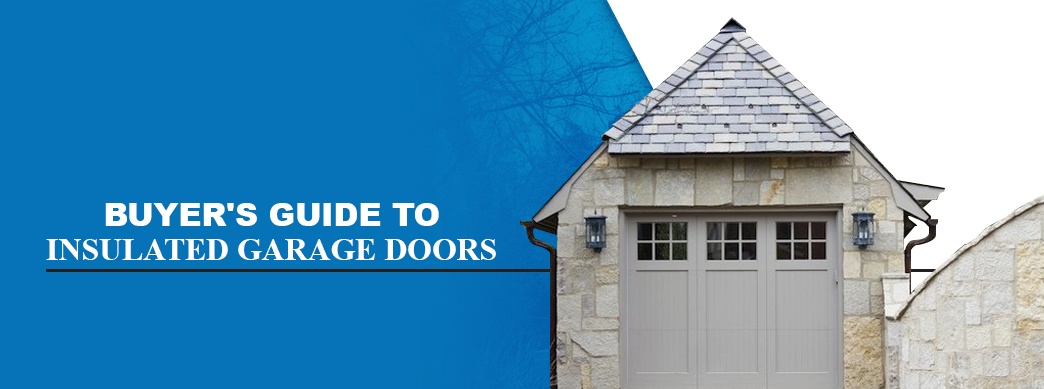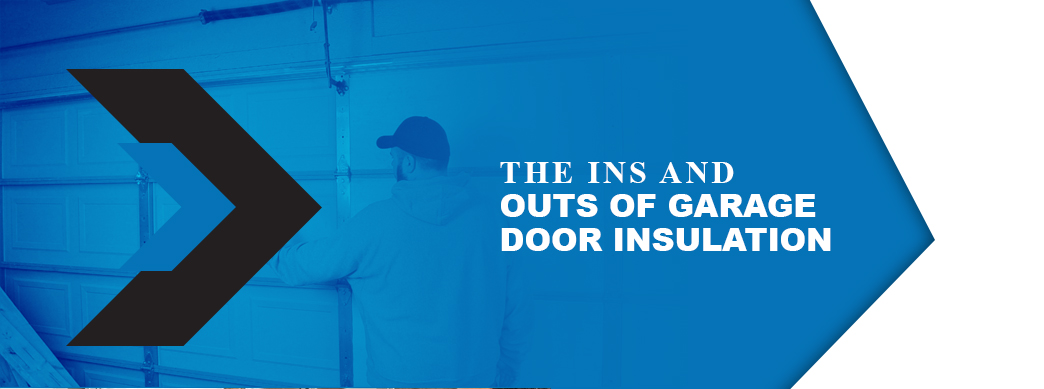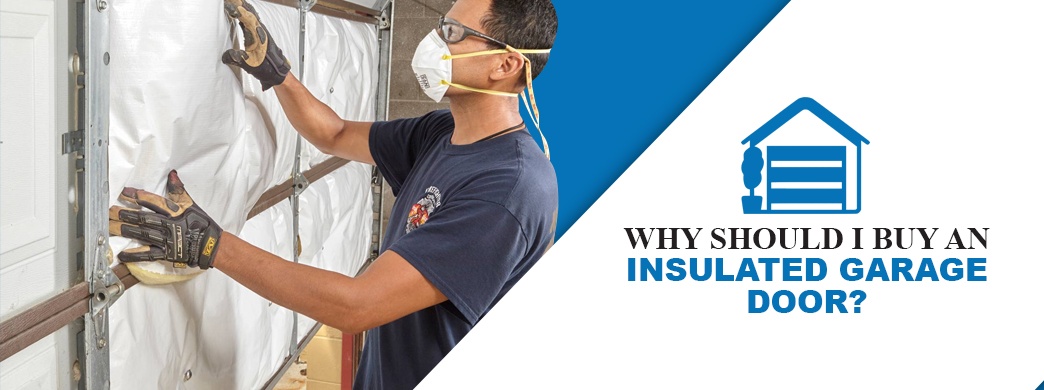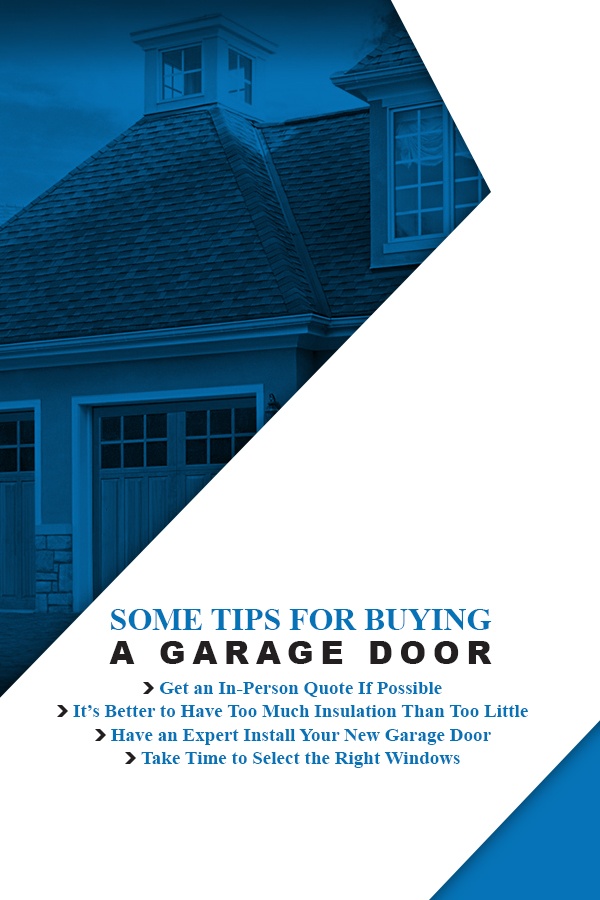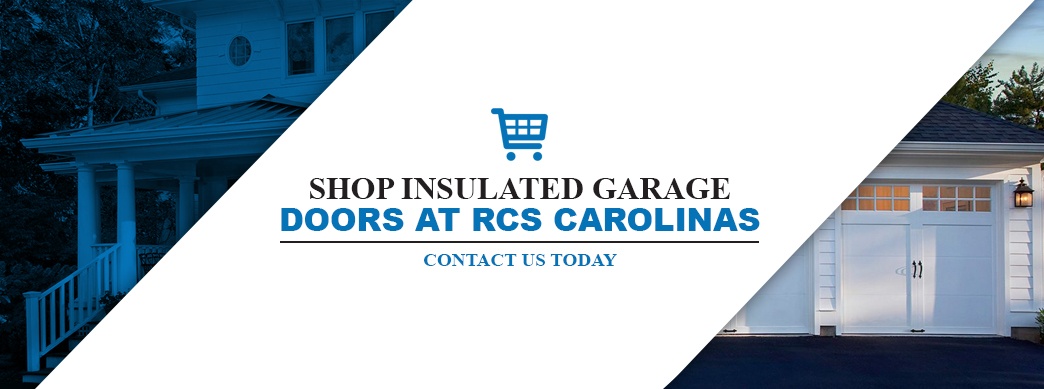It’s easy to forget about your garage door. It’s an item that we use daily but think about rarely. Yet from a street-level view, your garage door can comprise a surprisingly large area of the front of your home. While it may be hard to think of your garage door as an important factor in keeping your home heating costs under control or ultimately improving your selling price if you decide one day to leave your home, your garage door can play important roles in both cases.
For many people whose home has a garage, it’s one of the main entrances into their home. Your garage may connect to the kitchen or perhaps to a hallway. Your family may open and close the garage door six to eight times a day, depending upon the weather and how often you need to get to work, take kids to school or a doctor’s appointment or go to music lessons or sports activities.
The point is that you use your garage door a lot. If you live in a part of the country where temperatures can get cold in the winter, opening and closing a door so often can result in heat loss. And if your garage door is only made of steel, fiberglass or even wood, the heat loss can go on all day. Many homes have a bedroom or some other room over the garage. You can count on this being one of the coldest rooms in your home.
Conversely, in places where summer days can get to sweltering temperatures, having a well-insulated garage door will help keep your house cool, especially that room above the garage. An insulated garage door helps prevent this room from turning into a sauna during the hottest summer days.
That’s why it makes sense to have an insulated garage door. Additionally, an insulated garage door offers many other benefits besides keeping your garage warmer in the winter and cooler in the summer.
The Ins and Outs of Garage Door Insulation
When it comes time to purchase a new garage door, one of the many questions you may come across is, “Do you want your garage door insulated?” If your garage is attached, think of it as an extension of your home. These garages often have insulated walls to keep in heat so your garage can serve as a buffer between the home and outdoors. However, having an insulated garage without an insulated door is equivalent to leaving the door open.
The heat or cold that can pass through your garage door is enough temperature to draw from your home’s heating or cooling efforts.
Why Should I Buy an Insulated Garage Door?
When you decide to install an insulated garage door on your home, you’re making a wise decision as a homeowner for many reasons:
- With an insulated garage door, you conserve energy — your home loses less heat, and the garage stays warmer. In some cases, the differences between outside temperature and the temperature inside the garage when you have an insulated garage door can be as much as 40 degrees Fahrenheit.
- Keeping a garage warmer or cooler makes getting in and out of the car or working in the garage more comfortable for you, the homeowner. If you’ve decided to use your garage as an extra room in your home or as a workshop, not as a place to park your car, then having an insulated door turns what could be a cold, sterile space into a warm, comforting one. The same is true for the summer. If you live in a climate that can get very hot in the summer, insulated doors can help prevent the heat from penetrating your home and increasing your air conditioning bill.
- Insulated garage doors are less likely to flex and come out of alignment.
- Insulated doors are stronger than non-insulated doors. The insulation strengthens the doors in a way that makes dents less likely.
- Insulation also doubles as a sound buffer which makes opening and closing your garage door a quieter task. It also reduces noise from the street entering your home.
- Insulated doors can also give you great curb appeal. You can buy insulated doors in a style and color that perfectly complements the exterior of your home. For instance, you can select many different styles of windows to include in your insulated garage doors, which can provide your garage with lots of lighting during the day. When you decide to sell your home, having an attractive insulated garage door will allow you to increase your asking price.
- The moving and operational parts of the garage door and garage door opener operate better when they are kept in moderate temperatures. Extreme heat and cold put additional stress on these parts, making them more likely to have problems.
When you’re looking for an insulated garage door, there are several important factors to take into consideration that will help you decide the level of insulation that you’ll want for your garage:
1. BTU
BTU stands for British thermal unit. One BTU is the amount of energy required to raise the temperature of one pound of water one degree Fahrenheit.
2. R-Value
The ability of a material to mitigate the transmission of heat. The higher the R-value (0 to 19), the better the insulation performance.
Think of it this way – suppose you took a snowmaking machine and you blasted that snow at your garage door. If your garage door did not have any insulation, and you tested from the inside, there would be an excellent chance that it would be as cold inside as outside. If the door were insulated, however, it would be warmer, perhaps quite a bit warmer, than the outside door.
The same is true of heat. If you used an acetylene torch on an uninsulated door, it would be as hot to the touch on the inside as on the outside. But with insulation, it would be much easier to touch the door on the inside as it would be substantially cooler.
So when you choose a material for insulation that has a higher R-value, the better that insulation can stop the conduction of heat. Without insulation with a good R-value, the heat or cold will move from outside your garage to inside your garage and then throughout the rest of your house.
How much R-value do you need? That depends on where you live and how you are using your garage — to park cars, as a workshop, or as another room? Here is a quick guide to R-values:
- 0-4: Minimal to no insulation
- 5-8: Lightly insulated
- 9-13: Good insulation
- 14-19: Excellent insulation – good for those who heat their garages for garage work and want to ensure their garage doesn’t lose heat.
3. U-Value
U-value is another way to measure the conduction of heat. It is based on the amount of heat, in BTUs, transmitted through one square foot of material in one hour at a temperature difference of one degree Fahrenheit from one side to the other. The more heat transmitted through any kind of material, the higher the U-value. The lower the U-value, the better the insulation.
The one problem with U-values is that not every door manufacturer uses them. R-values are therefore the better choice when selecting a level of insulation for a garage door.
How Do Different Materials Used for Insulation Affect the R-Value?
Some materials provide better insulation than others. Materials such as polystyrene and polyurethane are the most commonly used types of insulation in garage doors. Though they are very similar materials, they work differently and provide different levels of protection.
- Polystyrene (Styrofoam) is inserted into the garage door in panels which means it cannot be an exact fit. Since it is not an exact fit, there is room for air to get into the garage. Polystyrene, the material used to make many coffee cups and peanut-shaped packing materials, is the kind of insulation that most major retailers use in their garage door insulation kits. If your garage door has two or three layers, you insert these rigid polystyrene panels between the layers. If you only have a single-layer garage door, the polystyrene includes a vinyl back that attaches it to the garage door.
- Polyurethane (spray foam), on the other hand, is sprayed into the door, which allows it to expand and bond to the surface. Injected polyurethane expands to fill every space inside the layer into which it is sprayed. This helps create a high level of sound insulation and greater climate control, and it also increases the strength of the door. The R-value is much higher with polyurethane than with polystyrene panels.
Tips for Buying a Garage Door
When you’re looking for a new garage door, either insulated or non-insulated here are a few tips to keep in mind:
1. Get an In-Person Quote If Possible
Not every garage door is the same. If you’re looking to replace an old one with a new insulated model, you can likely get a quote online. But it’s better to work with a knowledgeable representative from a local company. They’ll know the right details to check and can even help you with a possible design. Then they can give you a quote that will be much more accurate. A good sales representative will make sure you get the right garage door for your home.
2. It’s Better to Have Too Much Insulation Than Too Little
If you’re buying an insulated garage door is because you know it will save you money on your energy bill, it’s worth spending a little bit extra to use polyurethane on your doors. Sometimes you can double your R-value by using polyurethane rather than polystyrene.
3. Have an Expert Install Your New Garage Door
Professional installers have the tools and experience necessary to install your new door safely and quickly. A pro will have the job done in about four hours, and they’ll probably take the old door away as well, so you won’t have to worry about that either.
4. Take Time to Select the Right Windows
Selecting the right windows can make a garage door look fabulous. And, as we noted above, it will also bring a lot of light into your garage. Here are a few things to think about:
- Use insulated glass if your garage is heated.
- No homeowner wants someone to peek in through a window in your garage door. Install the windows in the top panels.
- Work with the sales rep to match the style of glass you use to the overall architectural design of your home.
Insulated Garage Doors We Offer
At RCS Carolinas, we offer a wide variety of insulated garage doors from Clopay, one of the best garage door companies in America. Here’s a look at some of what we have to offer:
Our Classic collection has two options if you’re interested in insulated doors — the Premium Series and the Value Plus Series. Both offer a range of R-values from 6.3 to 18.4. Whether you want a lot of insulation or just the right amount, we have the doors that will suit your purposes. You can choose from 14 different colors and a wide variety of window options.
Our Gallery collection features grooved panel steel carriage house doors. These doors can be purchased with or without insulation. Our insulated versions come with R-values from 6.3 to 18.4. A tough outer coating includes a hot-dipped galvanized layer, a baked-on primer and a final top coating to protect the door’s steel skin.
The Grand Harbor collection features carriage house doors made of steel and composite materials. They are great for new construction or if you’re looking for a low-maintenance replacement for your current garage door. Our insulated version offers an R-value of 6.3, the perfect choice if you live someplace where temperatures are more moderate. It still protects against a cold day or high temperatures. There are available in four colors, and you can use them with a wide variety of architectural styles.
These are only three of the options we offer. We have many others available to suit your budget and your sense of style.
Shop Insulated Garage Doors at RCS Carolinas
If you are looking for insulated garage doors with windows in Charlotte, N.C., look no further than RCS Carolinas. We have been in business for over 20 years helping people find the right garage door for their home or business. We offer doors manufactured by Clopay. Our staff of full-time design consultants and sales professionals will work with you to find the perfect door with a great design for your home.
You can visit our showroom at 8349 Arrowridge Blvd, Suite R in Charlotte, N.C., call us at (980) 480-9767 or request an estimate where you can leave us your contact details and submit your questions or comments. A member of our team will get back to you as soon as possible.


 Register My Door
Register My Door
